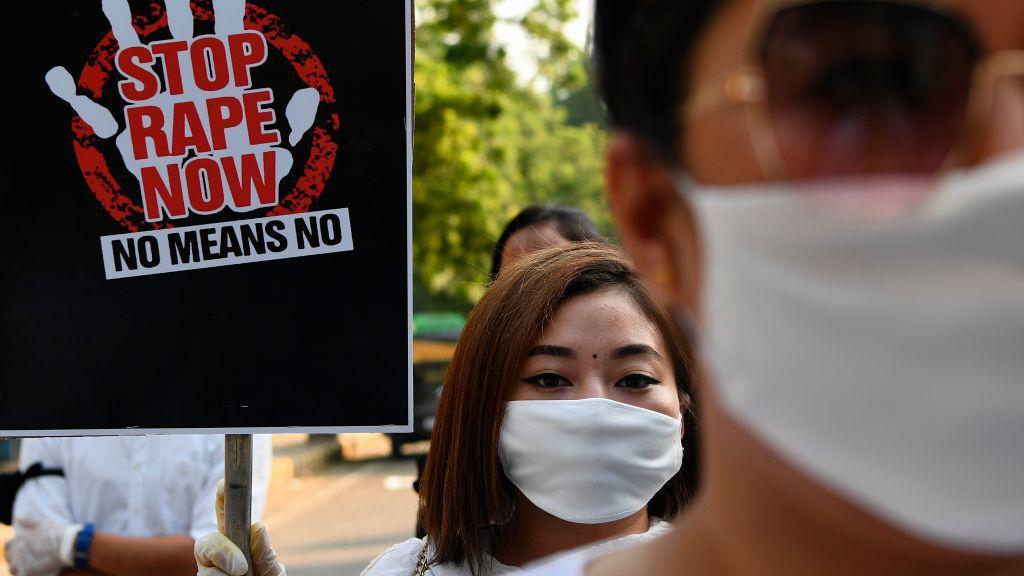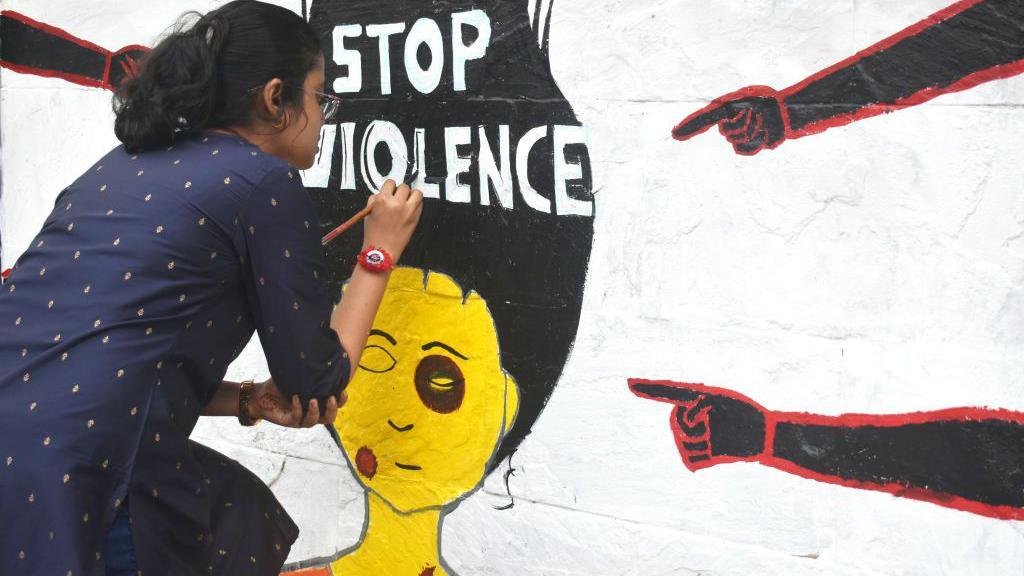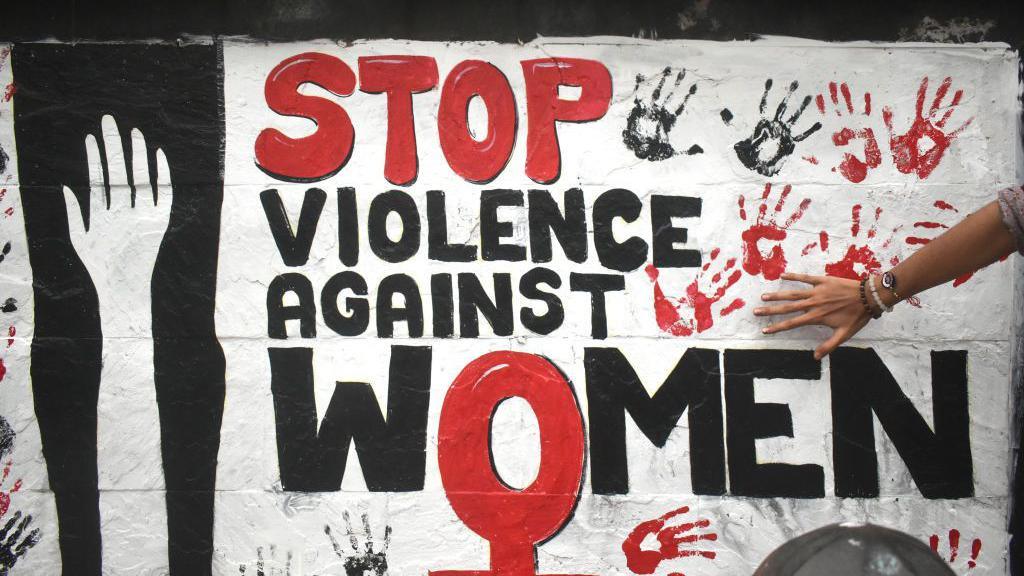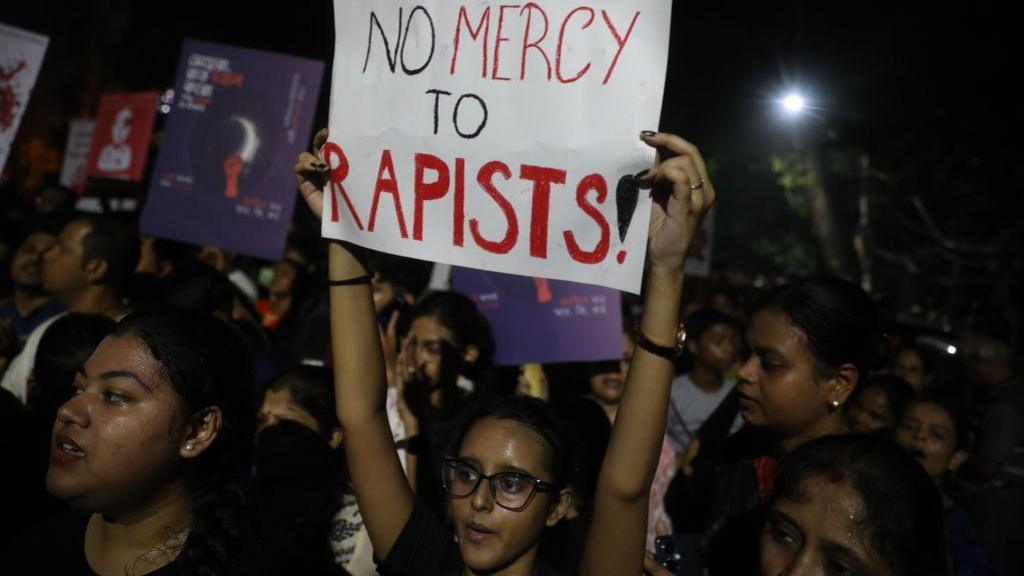India anger as judge frees man accused of raping wife who then died

India is among a few dozen countries that do not recognise marital rape
- Published
Warning: This report contains some disturbing details
An Indian court's ruling that a man's forced "unnatural sex" with his wife is not an offence has led to huge outrage and sparked renewed calls for better protections for married women.
The controversial order has also brought back into the spotlight the issue of marital rape in a country which has stubbornly refused to criminalise it.
Earlier this week, a high court judge in the central Indian state of Chhattisgarh set free a 40-year-old man who was convicted by a trial court in 2019 of rape and unnatural sex with his wife, who died within hours of the alleged assault.
The lower court had also found the man guilty of "culpable homicide not amounting to murder". He was sentenced to "rigorous imprisonment for 10 years" on each count, with all the sentences to run concurrently.
But on Monday, the High Court's Justice Narendra Kumar Vyas acquitted the man of all charges, saying that since India did not recognise marital rape, the husband could not be considered guilty of non-consensual sex or any non-consensual unnatural sexual act.
The judgement has been met with anger, as activists, lawyers and campaigners renew their calls to criminalise marital rape in India.
"To watch this man walk away is unacceptable. This judgement may be correct legally, but it is ethically and morally abhorrent," said lawyer and gender rights activist Sukriti Chauhan.
"An order that absolves a man of such a crime, to say it's not a crime, is the darkest hour in our legal system," she told the BBC.
"It has shaken us to the core. This needs to change and change quickly."

Violence against women is rampant in India
Priyanka Shukla, a lawyer in Chhattisgarh, said a judgement like this "sends out the message that because you're the husband, you have rights. And you can do anything, you can even get away with murder".
She added that this is not the first time a court has given such a judgement, and there is always anger.
"This time, the outrage is more because it is so gruesome and the woman died."
The court documents make for grim reading.
According to the prosecution, the incident took place on the night of 11 December 2017, when the husband, who worked as a driver, "committed unnatural sex with the victim against her will… causing her a lot of pain".
After he left for work, she sought help from his sister and another relative, who took her to hospital where she died a few hours later.
In her statement to the police and her dying declaration to a magistrate, the woman said she became ill "due to forceful sexual intercourse by her husband".
A dying declaration carries weight in court and legal experts say it is generally enough for conviction, unless contradicted by other evidence.
While convicting the man in 2019, the trial court had relied heavily on her dying declaration and the post-mortem report, which stated "the cause of death was peritonitis and rectal perforation" - simply put, severe injuries to her abdomen and rectum.
Justice Vyas, however, saw matters differently – he questioned the "sanctity" of the dying statement, noted that some of the witnesses had retracted their statements and, most importantly, said that marital rape was not an offence in India.

A number of petitions have been filed in recent years seeking to criminalise marital rape
The lower court's conviction was "a rarest of rare case", Ms Shukla said, "probably because the woman died".
"But what is shocking about the high court order is that there's not even one sympathetic comment from the judge."
Considering the nature of the assault, the high court's order has come as a shock for many, who believe the judge should not have dismissed the case so lightly.
India is among more than 30 countries - along with Pakistan, Afghanistan and Saudi Arabia - where marital rape is not a criminal offence.
A number of petitions have been filed in recent years seeking to strike down Section 375 of the Indian Penal Code, which has been in existence since 1860.
The British colonial-era law mentions several "exemptions" - or situations in which sex is not rape - and one of them is "by a man with his own wife" if she is not under 15 years.
Britain outlawed marital rape in 1991 but India, which recently rewrote its criminal code, retained the regressive law in its new statute book.
The idea is rooted in the belief that consent for sex is "implied" in marriage and that a wife cannot retract it later. Campaigners say such an argument is untenable in this day and age, and that forced sex is rape, regardless of who does it.
But in a country where marriage and family are considered sacrosanct, the issue has polarised opinions and there's strong resistance to the idea of criminalising marital rape.
The Indian government, religious leaders and men's rights activists have strongly opposed the move.
In October last year, the government told the Supreme Court that criminalisation of marital rape would be "excessively harsh". The federal home ministry said it "may lead to serious disturbances in the institution of marriage".
Authorities also insist that there are enough laws to protect married women against sexual violence. But campaigners say India cannot hide behind archaic laws to deny women bodily agency.

"A lot of people say the constitution cannot enter your bedroom," Ms Chauhan said.
"But doesn't it grant women - like all citizens - fundamental rights to safety and security? What kind of redundant country do we live in that we remain quiet when a woman has to face this level of violence?" she asks.
Violence within marriage is rampant in India.
According to a recent government survey, external, 32% of married women face physical, sexual or emotional violence by their husbands and 82% of married women, aged 18-49, who have experienced sexual violence said their current husbands were the perpetrators.
And even that doesn't give the true scale of the problem, Ms Shukla said, because a majority of women do not report violence, especially sexual violence, out of shame.
"In my experience, women are not trusted when they complain, everyone says it must be fake. The only time such cases are taken seriously is when a woman dies or the assault is particularly gruesome," the lawyer said.
Ms Chauhan believes nothing will change until the law changes.
"We need to criminalise marital rape. The wife not getting justice after such a gruesome incident deserves a nationwide campaign, which is not born of anger but is serious [and] well thought out."
She added that the government and men's activists try to project it as a "man versus woman debate".
"But the demand for criminalising marital rape is not against men, but for the safety and wellbeing of women. Is it not important to ensure women's safety?"